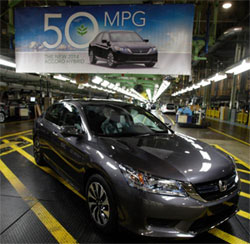The first models of Honda’s new Accord Hybrid are rolling off the assembly line, and the new version gets 50 miles per gallon in city driving (45 highway), competing with the Prius. It’s rated by the EPA as having a 673-mile driving range.
The 2014 Accord is the second hybrid Honda’s building in the US – at an Ohio manufacturing plant – the Honda Civic Hybrid is built in Indiana. The Accord goes on sale nationwide later this year.
To accommodate manufacturing processes specific to the hybrid, Honda invested $18.8 million in a 94,000-square-foot expansion at the Ohio plant.

The company also produces an Accord Plug-In that’s EPA-rated at 115 miles per gallon equivalent (MPGe) when its in electric mode. It gets 13 miles of electric-only range.
Honda says this version has a two-motor hybrid system using its Earth DreamsTM technology, which allows it to "realize top-of-industry efficiency."
Among other enhancements, the technology improves upon Honda’s long-used VTEC engine, increasing thermal efficiency and minimizing friction to achieve both high output and fuel efficiency. Other modifications to the engine make it 15% lighter and 10% more fuel efficient.
The technology is being included in its entire line of vehicles worldwide within the next three years, which, it says will cut carbon emissions 30% by 2020 from 2000 levels.
Learn more at Car and Driver:
Honda’s first Accord Hybrid launched in 2005, but it was a dud – not much different than the standard Accord, but selling for a much higher price.

Lipstick on a pig, that’s what Honda is delivering by squeezing every last once of out of their 20th century fossil fueled engines. 13 miles EV range is also an overpriced under-utilized opportunity to deliver real value to the driving public, aks any Volt owner, the majority which drive daily within the 40-50 EV mile range without every kicking-in the gas generator to extend EV range. Both the Asian and European manufacturers can learn from their American counterparts GM and Tesla on how best to execute drivetrain technology best suited to PHEV and EV platforms. It’s time to dump the fossil-fueled wasteland of today’s transportation and apply the opportunity of zero emission vehicle technology to the full range of cars and trucks.
Interesting that after all those years of being behind the Japanese in auto technology, GM’s Volt now beats them.